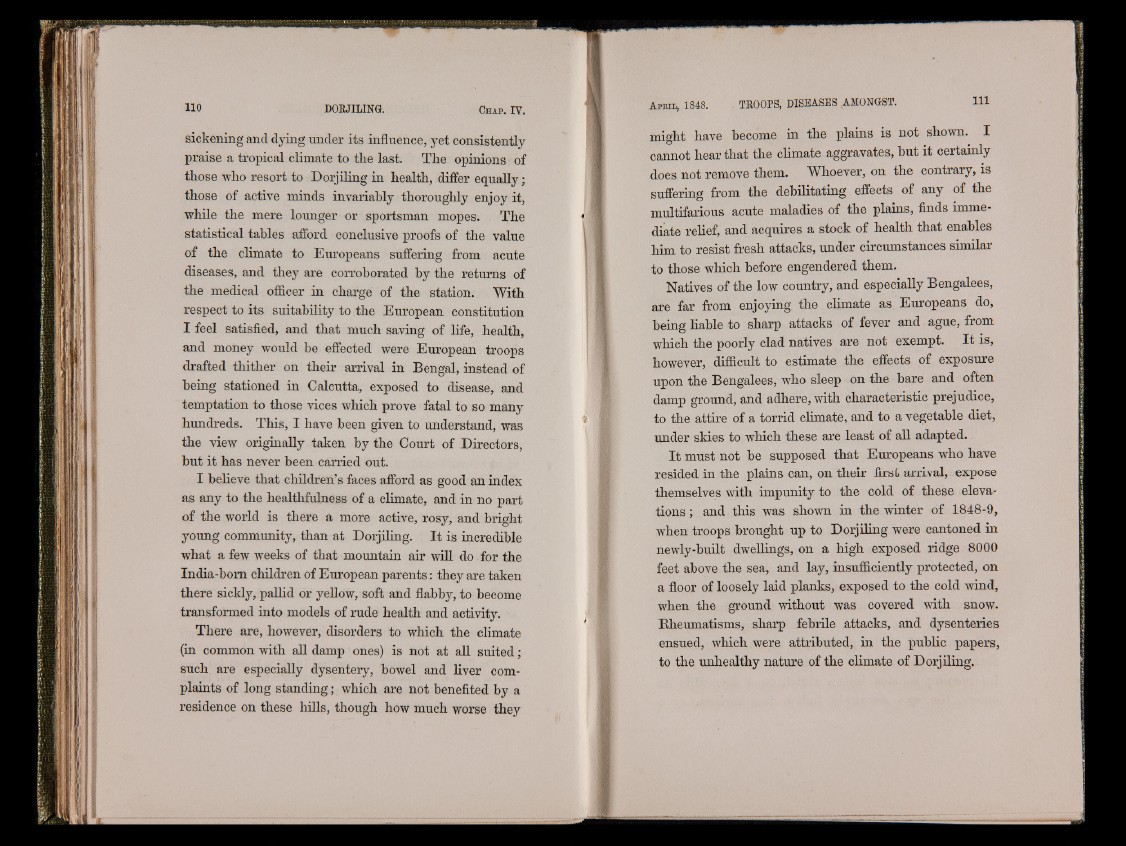
sickening and dying under its influence, yet consistently
praise a tropical climate to the last. The opinions of
those who resort to Dorjiling in health, differ equally;
those of active minds invariably thoroughly enjoy it,
while the mere lounger or sportsman mopes. The
statistical tables afford conclusive proofs of the value
of the climate to Europeans suffering from acute
diseases, and they are corroborated by the returns of
the medical officer in charge of the station. With
respect to its suitability to the European constitution
I feel satisfied, and that much saving of life, health,
and money would be effected were European troops
drafted thither on their arrival in Bengal, instead of
being stationed in Calcutta, exposed to disease, and
temptation to those vices which prove fatal to so many
hundreds. This, I have been given to understand, was
the view originally taken by the Court of Directors,
hut it has never been carried out.
I believe that children’s faces afford as good an index
as any to the healthfulness of a climate, and in no part
of the world is there a more active, rosy, and bright
young community, than at Dorjiling. I t is incredible
what a few weeks of that mountain air will do for the
India-born children of European parents: they are taken
there sickly, pallid or yellow, soft and flabby, to become
transformed into models of rude health and activity.
There are, however, disorders to which the climate
(in common with all damp ones) is not at all suited;
such are especially dysentery, bowel and liver complaints
of long standing; which are not benefited by a
residence on these hills, though how much worse they
might have become in the plains is not shown. I
cannot hear that the climate aggravates, but it certainly
does not remove them. Whoever, on the contrary, is
suffering from the debilitating effects of any of the
multifarious acute maladies of the plains, finds immediate
relief, and acquires a stock of health that enables
him to resist fresh attacks, under circumstances similar
to those which before engendered them.
Natives of the low country, and especially Bengalees,
are far from enjoying the climate as Europeans do,
being liable to sharp attacks of fever and ague, from
which the poorly clad natives are not exempt. I t is,
however, difficult to estimate the effects of exposure
upon the Bengalees, who sleep on the bare and often
damp ground, and adhere, with characteristic prejudice,
to the attire of a torrid climate, and to a vegetable diet,
under skies to which these are least of all adapted.
I t must not be supposed that Europeans who have
resided in the plains can, on their first arrival, expose
themselves with impunity to the cold of these elevations
; and this was shown in the winter of 1848-9,
when troops brought up to Dorjiling were cantoned in
newly-built dwellings, on a high exposed ridge 8000
feet above the sea, and lay, insufficiently protected, on
a floor of loosely laid planks, exposed to the cold wind,
when the ground without was covered with snow.
Rheumatisms, sharp febrile attacks, and dysenteries
ensued, which were attributed, in the public papers,
to the unhealthy nature of the climate of Dorjiling.